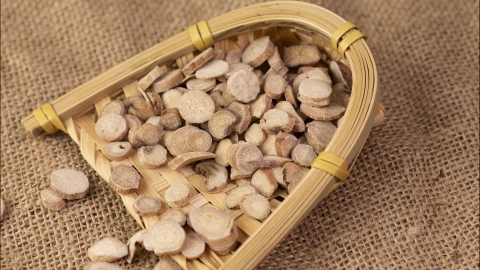Can Shu Di Huang, Sha Yuan Zi, and Bai Shao regulate spleen and stomach weakness?
Generally, Rehmannia glutinosa (prepared), Astragalus complanatus, and Paeonia lactiflora can help regulate spleen and stomach weakness; however, the use of Chinese herbal medicines should follow medical advice. Detailed explanations are as follows:

Rehmannia glutinosa (prepared) primarily nourishes yin and enriches blood. Spleen and stomach weakness often accompany qi and blood deficiency. Its function of enriching essence and blood indirectly provides material support for the transformation and transportation functions of the spleen and stomach, thus improving weakened spleen and stomach function caused by deficiency of qi and blood. Astragalus complanatus tonifies the kidneys and nourishes the liver. The kidneys are the root of innate constitution, while the spleen and stomach are the root of acquired constitution. Tonifying the kidneys can support the transformation and transportation functions of the spleen and stomach. The liver governs the free coursing of qi; nourishing the liver can promote smooth functioning of the spleen and stomach qi, indirectly assisting in restoring spleen and stomach function. Paeonia lactiflora nourishes blood and soothes the liver. When liver qi is harmonized, it does not improperly invade the spleen, thereby reducing interference from liver qi on the spleen and stomach. At the same time, its blood-nourishing effect can nourish the spleen and stomach and enhance their transformation and transportation abilities. Together, these three herbs synergistically support the regulation of spleen and stomach weakness by enriching qi and blood, regulating the liver and kidneys, and harmonizing liver qi.
When regulating spleen and stomach weakness, the dosage of Rehmannia glutinosa should be controlled because its greasy nature may impair the stomach. It can be combined with qi-regulating and spleen-invigorating ingredients such as tangerine peel or ginger to neutralize this effect. The dosages of Astragalus complanatus and Paeonia lactiflora should also be moderate to avoid excessive tonification that may impair the transformation and transportation functions of the spleen and stomach. For individuals with severe spleen and stomach weakness, reliance solely on this combination is insufficient; it should be used in conjunction with spleen-invigorating and stomach-nourishing herbs or ingredients. During consumption, raw, cold, or greasy foods should be avoided to prevent additional burden on the spleen and stomach. If symptoms do not improve after regulation, the treatment plan should be adjusted promptly.




